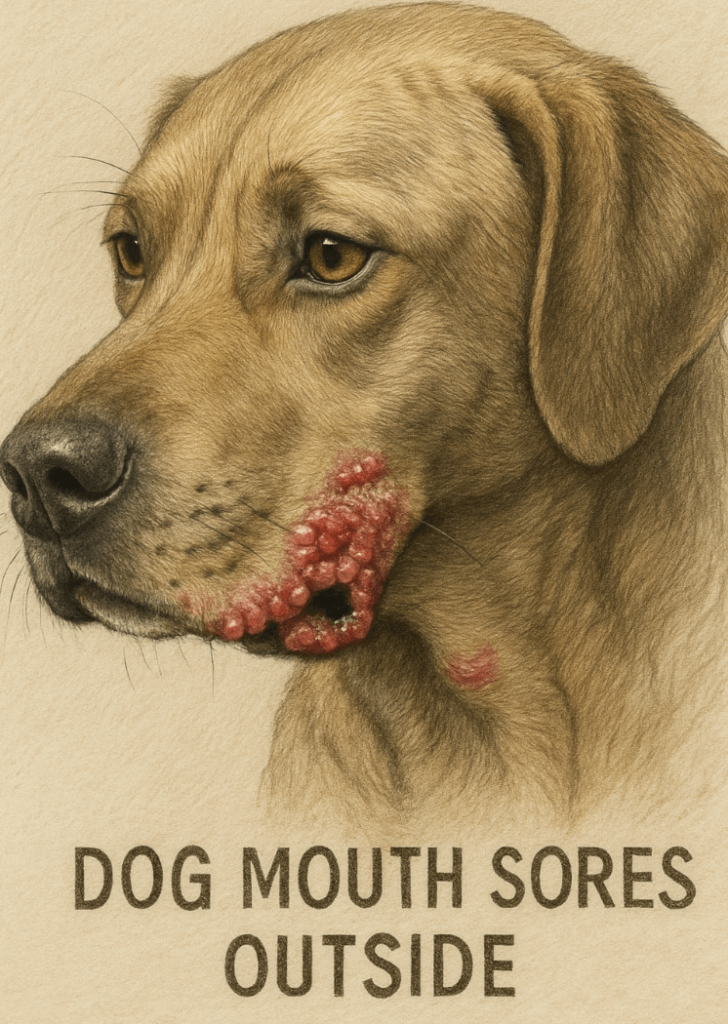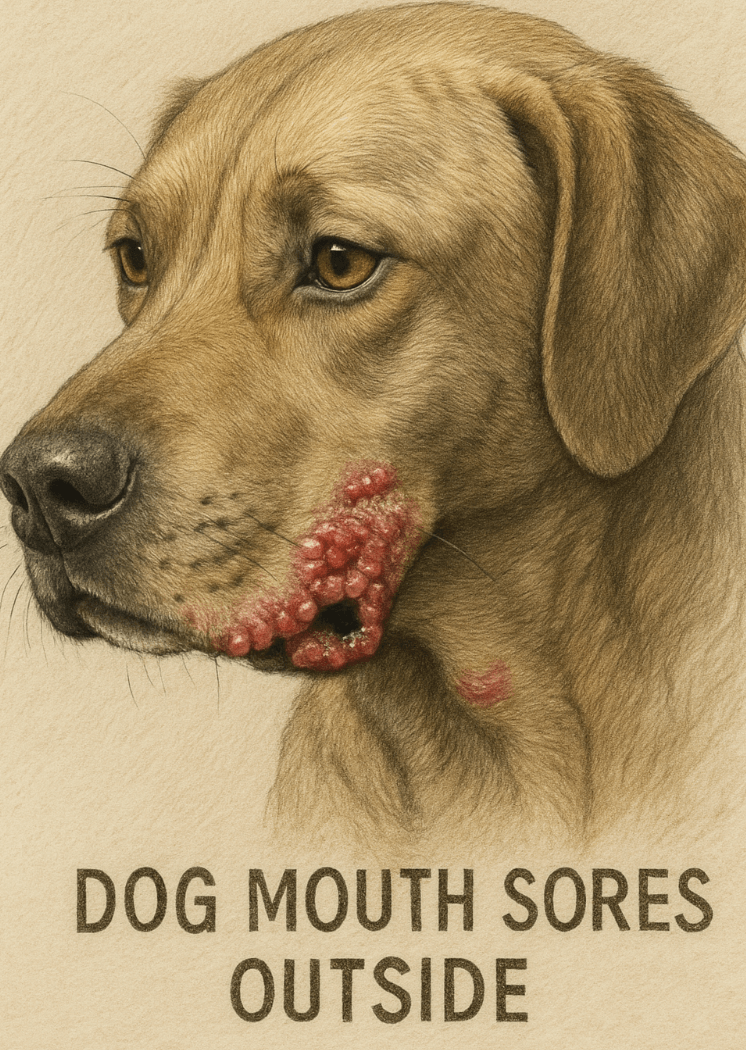Dog Mouth Sores Outside: Causes, Symptoms, and Treatment
As a loving dog owner, noticing sores on the outside of your dog’s mouth can be alarming. These sores may appear on the lips, gums, or around the muzzle, causing discomfort and potentially affecting your pup’s eating habits. While some cases are minor and heal on their own, others could indicate underlying health issues that require prompt attention. Understanding the causes, recognizing the symptoms, and knowing how to treat and prevent these sores is essential for keeping your furry friend healthy and happy. In this blog post, we’ll explore everything you need to know about dog mouth sores outside, from common triggers to effective remedies.
Common Causes of Dog Mouth Sores Outside
Mouth sores in dogs can stem from a variety of factors, ranging from minor irritations to more serious conditions. Identifying the root cause is the first step toward proper treatment.
Trauma or Injury:
Biting on hard objects, rough play, or accidental injuries can lead to sores forming on the lips or muzzle.Allergic Reactions:
Food allergies, environmental allergens, or contact with irritating substances can cause inflammation and sores.Bacterial or Fungal Infections:
Microbial infections, such as those caused by bacteria or yeast, can result in painful sores around the mouth.Viral Diseases:
Conditions like canine papilloma virus (warts) or distemper may manifest as sores or lesions on the mouth.Autoimmune Disorders:
Rarely, autoimmune diseases can cause the immune system to attack healthy tissue, leading to persistent sores.
Understanding these causes helps you take proactive steps to address the issue and seek veterinary care when necessary.
Symptoms to Watch For If Your Dog Has Mouth Sores
Recognizing the signs of mouth sores early can help you provide timely care and prevent complications. Look out for these telltale symptoms.
Visible Redness or Swelling:
Red, inflamed areas or swollen tissue around the lips or muzzle are common indicators of sores.Excessive Drooling:
Increased saliva production often occurs due to pain or irritation in the mouth.Difficulty Eating or Chewing:
Your dog may avoid food or show reluctance to eat if the sores are causing discomfort.Bad Breath:
Unpleasant odors from the mouth can signal an infection or bacterial buildup related to the sores.Licking or Pawing at the Mouth:
Dogs frequently lick or paw at affected areas in an attempt to soothe the irritation.
If you notice any of these symptoms, it’s important to monitor your dog closely and consult a veterinarian if the condition worsens or persists.
Check this guide 👉Understanding Dog Mouth Ulcers: Best 7 Health Tips!
Check this guide 👉Understanding Dog Mouth Anatomy: Best 7 Expert Tips!
Check this guide 👉Understanding Dog Mouth Cancer Life Expectancy: Best 7 Tips!

Causes of Dog Mouth Sores | Treatment Options |
|---|---|
Trauma or injury | Clean the area and apply antiseptic gel |
Allergic reactions | Identify allergens and adjust diet |
Bacterial/fungal infections | Prescribed antibiotics or antifungals |
Viral diseases | Veterinary diagnosis and supportive care |
Autoimmune disorders | Immunosuppressive medications as needed |
How to Treat Dog Mouth Sores at Home
While some cases of dog mouth sores require professional veterinary care, mild sores can often be managed at home with proper care and attention.
Clean the Affected Area:
Use a saline solution or pet-safe antiseptic wipes to gently clean the sore and remove debris.Apply Topical Treatments:
Apply veterinarian-recommended ointments or gels to promote healing and reduce discomfort.Adjust Diet Temporarily:
Offer soft, bland foods to minimize irritation while the sore heals.Provide Fresh Water:
Ensure your dog has access to clean water to stay hydrated and flush out toxins.Monitor Progress:
Keep an eye on the sore daily and seek veterinary advice if there’s no improvement after a few days.
With careful observation and gentle care, many sores can heal quickly without further intervention.
Preventing Dog Mouth Sores Outside
Prevention is always better than cure when it comes to your dog’s health. Taking these preventive measures can reduce the risk of mouth sores developing.
Inspect Toys and Chew Items Regularly:
Replace worn-out toys or sharp-edged chews that could injure your dog’s mouth.Maintain Good Oral Hygiene:
Brush your dog’s teeth regularly and schedule routine dental check-ups to prevent infections.Avoid Irritating Substances:
Keep chemicals, cleaning products, and plants toxic to dogs out of reach.Feed a Balanced Diet:
Provide high-quality, hypoallergenic food to minimize the risk of allergic reactions.Watch for Behavioral Changes:
Early detection of unusual licking, chewing, or drooling can help catch problems before they escalate.
By implementing these strategies, you can safeguard your dog’s oral health and overall well-being.
Dietary Adjustments to Prevent Mouth Sores
A balanced diet plays a crucial role in maintaining your dog’s overall health, including their oral well-being. Here are some dietary tips to help prevent mouth sores.
Choose High-Quality Food:
Opt for premium dog food free from artificial additives that might irritate sensitive mouths.Incorporate Omega-3 Fatty Acids:
Foods rich in omega-3s, like fish oil, support skin and tissue health, reducing inflammation risks.Limit Hard Treats:
Avoid excessively hard treats or bones that could damage delicate oral tissues.Introduce Probiotics:
Probiotic supplements promote gut health and strengthen the immune system, aiding recovery from infections.Test for Food Allergies:
Conduct elimination diets under veterinary supervision to identify potential allergens triggering sores.
A thoughtful approach to nutrition can significantly reduce the likelihood of recurring mouth sores.
Signs That Indicate a Serious Underlying Condition
While many mouth sores are harmless, some symptoms warrant immediate veterinary attention. These red flags suggest a deeper issue requiring professional diagnosis.
Persistent Bleeding:
Sores that bleed excessively or fail to clot may indicate clotting disorders or severe trauma.Unexplained Weight Loss:
Sudden weight loss alongside mouth sores could signal systemic illnesses like cancer or kidney disease.Fever or Lethargy:
A fever or lack of energy suggests an infection or inflammatory response beyond the oral cavity.Swollen Lymph Nodes:
Enlarged lymph nodes near the jawline point to possible infections or immune-related conditions.Ulcer-Like Lesions:
Deep, crater-like sores often accompany autoimmune diseases or advanced infections needing specialized care.
Recognizing these warning signs ensures timely intervention and improves outcomes for your dog.
Natural Remedies to Support Healing
For minor mouth sores, natural remedies can complement traditional treatments and promote faster recovery. Always consult your vet before trying new methods.
Coconut Oil Application:
Coconut oil’s antibacterial properties can soothe irritated tissues and speed up healing.Aloe Vera Gel:
Pet-safe aloe vera reduces inflammation and moisturizes dry, cracked areas around the mouth.Chamomile Tea Rinse:
Cool chamomile tea applied with a cotton ball acts as a calming anti-inflammatory solution.Turmeric Paste:
Mix turmeric powder with water to create a paste; its antimicrobial qualities aid healing.Honey Spot Treatment:
Raw honey’s natural enzymes and antioxidants provide gentle relief and protect against infection.
These natural options offer safe, holistic ways to support your dog’s recovery process.
Frequently Asked Questions About Dog Mouth Sores Outside
Are dog mouth sores contagious?
Most sores are not contagious, but viral infections like papilloma virus can spread between dogs.
When should I see a vet?
Seek veterinary care if the sores persist for more than a week, worsen, or are accompanied by other symptoms like lethargy or fever.
Can allergies cause mouth sores?
Yes, food or environmental allergies can trigger inflammation and sores around the mouth.
What over-the-counter treatments are safe?
Always consult your vet before using any OTC products, as some human medications are toxic to dogs.
How long do mouth sores take to heal?
Mild sores typically heal within 7-10 days with proper care, while more severe cases may require longer treatment.
Prioritizing Your Dog’s Oral Health
Mouth sores on the outside of your dog’s mouth can range from minor irritations to signs of more serious health issues. By staying vigilant, addressing symptoms promptly, and taking preventive measures, you can ensure your furry companion stays comfortable and healthy. Remember, your dog relies on you to advocate for their well-being—so don’t hesitate to seek professional guidance when needed. With proper care and attention, you can keep those puppy kisses coming without worry!
Dog Mastiff Breeds: Best 7 Expert Tips! – Discover the unique traits, care needs, and training tips for majestic mastiffs to find your perfect gentle giant.
Lakeland Terrier Dog: Best 7 Expert Tips! – Discover the bold personality, care needs, and training tips for this lively terrier breed. Perfect for active families!
Can Cat Bloat Resolve on Its Own? Best 7 Expert Tips! – Learn when bloat may pass naturally, spot warning signs, and know when to seek urgent vet care.
Maltipoo Dog Size: Best 7 Expert Tips! – Discover the ideal weight, height, and growth stages for your Maltipoo to ensure a healthy, happy companion.





